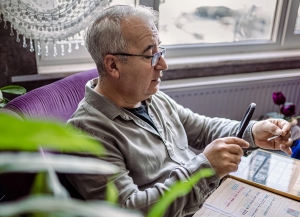When you were a kid, did you have a hobby? Whether you collected stamps, dolls, or comic books, repaired bikes or dabbled in model cars, you can probably recall your hobby ‘getting you in the zone’. Being so fully immersed in what you were doing that it was hard to break away to even eat dinner. When your former hobby comes to mind, it may bring up feelings of joy, satisfaction, and accomplishment. No matter your age, the positive feelings that arise from being engaged in a hobby contribute to emotional and physical well-being. Even if you haven’t had a hobby for many years, it’s never too late to find a new hobby and experience the health benefits.
Hobbies are a simple yet profound way to support an older adult’s health and happiness. A hobby can provide an outlet for creativity, an intellectual challenge, pure fun, and social engagement. When engaged in a hobby, we are immersed in a state of pleasure and detachment from the drama of daily life.
Some of the ways hobbies contribute to an older adult’s well-being include:
- Boost feelings of personal accomplishment, which supports self-esteem
- Foster connections with others, which reduces loneliness
- Reduce stress by providing an outlet for creativity and emotional management
- Mental engagement, which protects brain health
- Lower risk for depression and anxiety
- Contributes to meaning & satisfaction in life
4 Tips for Finding a New Hobby in Older Adulthood
Now that you know hobbies are good for your health—what if you haven’t engaged in a hobby in a while—where do you begin? There are some very simple ways older adults can discover a new hobby. Before we tell you how to find a new hobby, let’s talk about your mindset with starting something new: The key is to not be afraid to experiment or to try new things. Step outside your comfort zone. For example, if you tend to be a homebody, consider a book club to get you out of your home and engaged with new people who share a common interest. Additionally, keep an open mind. Don’t give up after one try—remember that a hobby should be about the process, not the outcome or product (that would make a hobby feel like work!) Finally, don’t put pressure on yourself; give yourself permission to fail, and to start over again. Give it the good ole "college try" before you walk away from a hobby that just doesn’t feel like a good fit for you.
- Consider the feeling or experience you’re missing in your life. Ask yourself how you want to feel when engaged in your new hobby. Is it a sense of calm, exhilaration, curiosity, mental engagement, or social connection? A combination? Identifying your needs particularly emotional needs, can point you toward your next hobby.
- Start with simple steps, slowly taken. If you’re on budget, as most older adults, don’t jump into the deep end with a new hobby. If you’ve always wanted to learn to oil paint, don’t invest in the most expensive set of brushes and paints. Take a class where you can use materials, learn about products, and be sure it’s something you really like and can have fun with.
- Keep a hobby interest list. This can be an index card posted on your fridge or a notebook you carry with you—where you can jot down things that are interesting to you, that you want to learn. Maybe you read an article about
keeping bonsai trees and add that to your list. Every month check your list—what still interesting to you on that list? Why did you put bonsai tree on that list? Does it still resonate with you? If so, is now a good time to learn what’s involved? Then get started researching online or...
- Talk to your local librarian. Librarians aren’t just a wealth of knowledge about books. They can help you research new hobbies—from books to online resources to local classes. A librarian can help you take those first small steps on the path to a new hobby.
If you happen to live in an older adult community such as Everbrook Senior Living—or if you are thinking of moving to such a community—you’ll be glad to know there are many resources available to help you discover a new hobby in later life. From board game clubs to yoga classes, art studio to music or film appreciation... you’ll be amazed at the opportunities offered by a senior living community. And, as a bonus, if you’re already proficient with a particular hobby then make sharing your skill your next hobby! Many senior living communities love to have a resident volunteer to introduce and teach a skill to other residents with the same interest.
Are you looking for a senior living community with a robust social community, wellness program, and affordable luxury? Come visit Everbrook Senior Living to see all that we offer—and the sense of belonging our residents experience as they live, play, and thrive in our older adult communities across Connecticut, Massachusetts, and New Hampshire.
Resources
National Institutes of Health: Participate in Activities You Enjoy As You Age
Penn State University, “Social Trends”: How Hobbies Boosty Your Health



